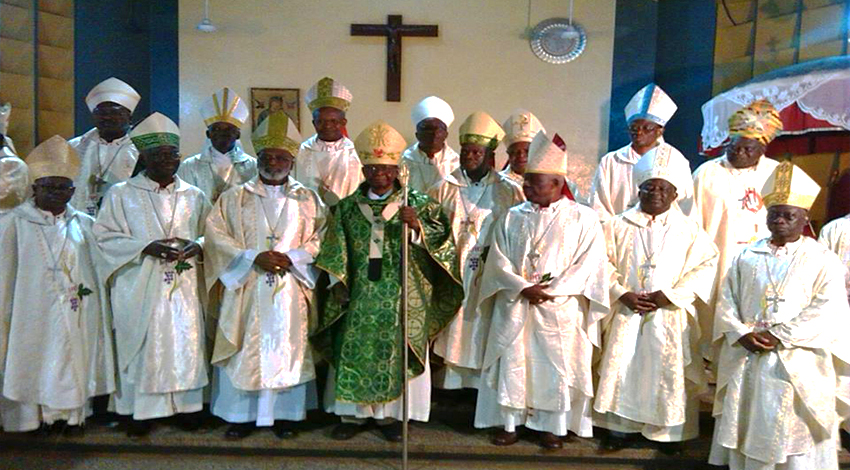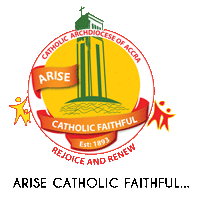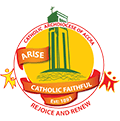
COMMUNIQUE ISSUED BY THE GHANA CATHOLIC BISHOPS’ CONFERENCE AT THE END OF THEIR ANNUAL PLENARY ASSEMBLY HELD IN TAMALE IN THE NORTHERN REGION OF GHANA OCTOBER 7 – 14, 2016 2016 GCBC Communique
GREETINGS
Grace and Peace of our Lord Jesus Christ, who teaches us to be merciful just as the Father is merciful, be with you all (cf. 1 Cor 1:3, Lk 6:36).
GRATITUDE
We are grateful to Almighty God for the blessings of peace and stability our country is enjoying. We appreciate all persons and institutions working to keep the country stable. We also thank God for the life of every Ghanaian, at home and abroad, and all who reside in Ghana.
PREAMBLE
We, the Ghana Catholic Bishops’ Conference, have held our annual Plenary Assembly at the Nim Avenue Hotel in Tamale in the Northern Region of Ghana from October 7 to 14, 2016 under the theme: “Reconciliation with God, Humanity and Nature in the Year of Mercy”. We have drawn inspiration from two very important events of the Church, namely, the celebration of the Extraordinary Jubilee Year of Mercy (from December 8, 2015 to November 20, 2016) and the release, by Pope Francis, of the Encyclical Laudato Si’ (On Care for our Common Home). We will have the national climax for the celebration of the Year of Mercy here in Tamale on Sunday, October 16, 2016.
We had the opportunity to visit and interact with the Northern Regional Minister, Hon. Abubakar Abdallah, and some members of the Northern Regional Coordinating Council as well as the Kampakuya Naa Abdulai Andani, Regent of the Dagbon Kingdom. We also held meetings first, with Mrs. Charlotte Osei, the Chairperson of the Electoral Commission, and two other Commissioners, and then, with Hon. Prosper Douglas Bani, Minister for the Interior, Dr. John Kudalor, the Inspector General of Police and other officers of the Security Forces and Services. In the light of our theme and in consideration of the socio-political situation of our country Ghana, we wish to share with you the following reflections.
RECONCILIATION WITH GOD
Mercy is the ultimate and supreme act by which God comes to us. God has always had a special affection for humanity (cf. Ps 8) so much that even after Adam and Eve’s fall in the Garden of Eden (cf. Gen 3), He purposefully and progressively showed mercy to reconcile us to Himself. Throughout the Old Testament, God presents Himself as “gracious and merciful, slow to anger and abounding in steadfast love, and relents in punishing” (Joel 2:13), “One who takes delight in the vindication of His children” (Is 62:1), and “One who cannot forget His children” (Ps 137:5-6).
God has shown us the fullness of His love and mercy through the gift of His Son, Jesus Christ (cf. Jn 3:16). Jesus Christ is the reflection of His Father’s Mercy and taught us to be merciful and take advantage of the opportunities of reconciliation (cf. Lk 6:26-36), through the parables of the lost sheep, the lost coin and the merciful father (cf. Lk 15:1-32).
In the Church, the unfathomable mercy of God that reconciles us with Him is dispensed by the gift of the Holy Spirit through the ministry of bishops and priests (cf. Jn. 20:21-23). In the Sacrament of Reconciliation, God the Father initiates the call for reconciliation, Jesus Christ welcomes the penitent and the Holy Spirit rewards the penitent who responds to God’s invitation and sincerely approaches the fountain of mercy. Mercy is the bridge that connects God and man, opening our hearts to a hope of being loved forever despite our sinfulness. Having reconciled us to Himself through mercy, God sends us into the world as ambassadors of His reconciliation (cf. 2 Cor 5: 18-20).
RECONCILIATION WITH HUMANITY
Mercy is the fundamental law that dwells in the heart of every person who looks sincerely into the eyes of his brothers and sisters on the path of life. Having had the privilege of knowing and sharing in the love and mercy of God, we, the beneficiaries, have the sacred duty to live and testify to mercy.
We, who form the Body of Christ, loved and forgiven, have been commissioned to announce the mercy of God in truth and in action. Let us therefore pattern our behaviour after Jesus Christ who went out to everyone without exception. We encourage a sincere spirit of reconciliation between the bishops and their collaborators, among priests and religious, religious leaders and their members, chiefs and their subjects, political leaders and their followers, societies, groups, employers and employees, spouses, parents and their children, and within families.
In our endeavour to be merciful just as our Father is merciful (cf. Lk 6:36), let us open our hearts to all people – our families, friends, brothers, sisters and even our enemies – wounded by our humiliating indifference. Let us bind them with mercy and cure them with solidarity and vigilant care.
Let us all be mindful always of the words of Jesus Christ: “Whatsoever you do to the least of my brothers (and sisters), you do to me” (Mt 25:40). Reawakened in conscience, let us feed the hungry, give drink to the thirsty, clothe the naked, welcome the stranger, heal the sick, visit the imprisoned, bury the dead, counsel the doubtful, instruct the ignorant, admonish sinners, comfort the afflicted, forgive offences, bear patiently with those who do us ill and pray for the living and the dead (cf. the Seven Corporal Works of Mercy and the Seven Spiritual Works of Mercy). These are more profound means of reconciling with one another.
RECONCILIATION WITH NATURE
Mercy must equally prompt our actions from harming our natural environment. Human beings connect with nature in various ways: “… our bodies are made up of her elements, we breathe her air and we receive life and refreshment from her waters…” (Laudato Si’, 2). The earth is our common home. Yet, we have inflicted harm of various kinds and degrees on our natural environment by our irresponsible use. We have plundered our environment recklessly through indiscriminate dumping of rubbish and industrial waste, ‘galamsay’ activities, logging, deforestation, water pollution and other forms of ecological degradation.
We urge all Catholics and Ghanaians in general, to thank God for the wonderful handiwork which God has entrusted to our care and to reaffirm our personal vocation to be stewards of creation, and to implore His help for the protection of creation as well as His pardon for the sins committed against the world in which we live.
God gave us the earth “to cultivate and to take care of” (Gen 2:15) in a balanced and respectful way. To cultivate too much and to care too little, is to sin. In this Year of Mercy and beyond, let us resolve to implore God’s mercy for those sins against creation that we have not hitherto acknowledged and confessed. We likewise commit ourselves to taking concrete steps towards ecological conversion, which requires a clear recognition of our responsibility to ourselves, our neighbours, creation and the Creator.
We are unhappy with the growing incidence of land grab in the country and the indiscriminate acquisition of large tracts of land by multinational corporations, usually led by greedy and unpatriotic indigenes. While we do not discourage investment in food production and opportunities for industrialization, we condemn land acquisition that robs Ghanaians of their heritage and impacts negatively on the ecosystems and food cultures of our people. We call on all key institutions, charged with the planning, administration and conservation of land, to stop the incidence of land grab.
The Catholic Church in Ghana embraces wholeheartedly the renewed work of mercy and care for our common home which “… allows us to discover in each thing a teaching which God wishes to hand on to us…” (Laudato Si’, 85). We pledge to demonstrate our care for our common home in simple daily gestures which break with the logic of violence, exploitation and selfishness and makes itself felt in every action that seeks to build a better world.
We commend the current call, throughout the country, for the monthly clean-up exercises within our immediate surroundings. We further urge Ghanaians to do these exercises more frequently and religiously. As we seek to be godly, let us equally endeavour to be cleaner. We cannot be happy with the perception that Ghana is among the world’s dirtiest countries. Let us treat our environment the very way we will treat ourselves since a healthy environment makes us healthier and happier.
CHURCH AND STATE PARTNERSHIP
We, wish to plead with the State, especially the Legislature, the Ministry of Education and other key stakeholders, to expedite action on the passing of the Education Bill into law. It is our hope that this important Bill, when passed into law, will clarify the specific role and partnership between the Church and State in addressing more firmly, fairly and responsibly the needs of education in our country. We insist that the Bill should take into consideration the proposals the Christian Council of Ghana, the Ghana Catholic Bishops’ Conference and other faith-based institutions have tabled before the Minister for Education.
On health, we demand that the National Health Insurance Authority (NHIA) refund to health facilities their allocations for services rendered to Ghanaians through the insurance scheme. We call upon the Ministry of Health to intervene as a matter of urgency so that all health service institutions in Ghana can sustain and promote their healing ministry through their hospitals and clinics. A healthy human capital will ensure a healthier Ghana.
DIALOGUE AND PEACE
Unlike other parts of the world where religion is sometimes used to promote and sustain conflict, it is heartwarming to learn that, here in Tamale and elsewhere in Ghana, Muslims interact peacefully with Christians in schools, hospitals and various places of work.
We sincerely commend the successive governments and various Non-Governmental Organizations (NGOs), Civil Society Organizations (CSOs) and Faith-based Organizations (FBOs) for their efforts of promoting peace in the Northern Region, a region perceived as most vulnerable to diverse conflicts. We hereby state that government’s efforts should be aimed at a more holistic and sustained approach in addressing the very factors that fuel these conflicts. Since peace is the new name for development (cf. Pope Paul VI’s Populorum Progressio), in seeking the development of the Northern Region, the need for sustainable peace cannot and should not be overlooked, especially in this season of elections.
CONCERNS ON THE 2016 GENERAL ELECTIONS
We have observed that in some parts of Africa and elsewhere in the world, political elections have left behind unhealed scars of violence and disrespect for the rule of law. The consequence of these acts has not only unleashed irrecoverable cost on those nations but also miserable plagues of instability and insecurity.
Since Ghana will go to the polls on December 7, 2016, let us implore God to look mercifully upon our country Ghana and help choose, through a diligent and sincere exercise of our franchise, leaders after His own heart. Our prayer in the National Anthem, “God bless our homeland Ghana, and make our nation great and strong” will win divine blessings for us only when we acknowledge God for who He is and make amends with Him daily. A country cannot develop without the fear of God.
A decision on who should lead us is a decision for the development for our nation. Therefore, our political campaigns and platforms should not trade insults and attack political figures. We are one people as Ghanaians and we cannot accept that elections should divide us. Let us therefore safeguard our unity, growth, development and destiny as one people.
On March 6, 2017, our beloved Ghana will celebrate the 60th Anniversary of her independence. We intend to hold a National Eucharistic Congress in 2017 to rededicate, through prayer and reflection, our dear Motherland to our Lord and Saviour, Jesus Christ. We are at the same time very much concerned about the prevailing political atmosphere as we prepare for the forthcoming elections. We, Ghanaians, would want to celebrate our 60th Independence Anniversary in a peaceful and congenial Ghana. For the sake of peace and safety of Ghana before, during and after the December elections, we wish to draw the attention of all Ghanaians to the following concerns.
- Electoral Commission
The integrity and success of the forthcoming elections depend primarily on the Electoral Commission. It is the institution constitutionally mandated, among other duties, to compile the register of voters and revise it periodically, to demarcate the electoral boundaries for both national and local government elections, to conduct and supervise all public elections and to educate the people on the electoral process and its purpose. We commend the Electoral Commission for all the measures it has put in place to ensure peaceful, free, fair, transparent and credible elections. We strongly urge that the Commission should be provided with all the logistics necessary for the elections. We call on Ghanaians to repose trust and confidence in the work of the Electoral Commission throughout the period of elections.
- Political Parties
We appeal once again to politicians, members and supporters of the various political parties, during their campaigning, to avoid the temptation of making promises that they know they cannot fulfil, because this amounts to deceiving the people of Ghana. We urge them to avoid hate-filled statements and expressions that threaten revenge and vendetta.
We also call on party leaders, parliamentary and presidential candidates to conduct themselves honourably and to respect their opponents, both in their utterances and actions. Politicians should realize that their political opponents are not their enemies but neighbours who share different views. Since it is only the Electoral Commission that is empowered to announce the results of the elections, we ask all political parties, radio stations, the social media, and indeed everyone, to refrain from announcing any results before they are declared by the Electoral Commission. Further, we are very concerned about the phenomenon of vote buying by politicians. Such practice is an insult to the intelligence and dignity of the unsuspecting voters. We encourage politicians to stop such acts and entreat the electorate from yielding to such needless enticements.
- Security Agencies
We commend the Security Agencies for working towards security and peace in Ghana. We urge them to discharge their duty with dispatch and without fear or favour. We encourage them to demonstrate a high sense of professionalism by respecting the rights and dignity of all Ghanaian citizens.
The culture of impunity which has been manifested in sections of the Ghanaian society by some individuals and groups contributes to high levels of lawlessness in the country. We condemn, in no uncertain terms, the sycophancy and the operations of unauthorized vigilante groups. Consequently, we state that the prevalence of so-called “machomen” who prowl around intimidating and brutalizing innocent Ghanaians should be dealt with. We have received information on the recent gruesome assault on two Catholic priests by a “machoman” at Adugyama in the Ahafo Ano South District of the Ashanti Region. We condemn this and other similar assaults. We plead with the security agencies and the judiciary to deliver justice expeditiously in this and other cases.
- Electorate
While an election, in and by itself, cannot guarantee good governance, it can facilitate or hinder development depending on how it is managed. Participation in the political life, in the light of fundamental moral principles, is therefore an essential duty of every Christian and of all people of good will. We therefore encourage all registered voters to be vigilant as they exercise their franchise. To decide not to vote is to neglect your duty and run the risk of leaving others to decide your future for you. In the name of peace, parents and guardians are reminded that they have a God-given responsibility to discourage their under-aged children and wards from voting. In the same vein, we appeal to non-Ghanaians who registered, for one reason or the other, to refrain from voting. Let us all remember that we can have peaceful elections only if we ensure justice before during and after the elections.
- Media
We call upon the media to uphold the highest journalistic values and ethics in their reportage of the electoral process. We recommend that news about the elections should not be based on hearsay or prejudice. Information must be verified and the truth professionally ascertained. News and stories should not be targeted at causing disgrace or embarrassment to personalities, especially where it is clear that such reportage may trigger disaffection or incite violence.
- Politicians and Traditional Leadership
Presidential and parliamentary aspirants share similar constituencies with various kings and chiefs of our traditional communities. We appeal to presidential and parliamentary candidates not to take for granted or interfere with the authority and functions of these traditional leaders and the institutional structures upon which they rest. We entreat our kings and chiefs to protect the integrity of their stools and skins by refraining from meddling in partisan politics to the displeasure of their subjects as if to say that the party they associate with or endorse is representative of their subjects’ choice as well. Politicians and traditional leaders must work to foster peace and seek the integral development of Ghanaians rather than to divide them. Further, we strongly urge Religious leaders to be circumspect in their pronouncements and predictions on the outcome of the elections.
CONCLUSION
In conclusion, we urge all to pray, particularly in this month of October, dedicated to Mary, the Mother of our Lord Jesus Christ, for the peace, progress and unity of Ghana. May Mother Mary, Queen of Peace and Queen of Africa, intercede for us.
God bless our homeland Ghana. Long Live Ghana!
Signed by:
MOST REV. PHILIP NAAMEH,
CATHOLIC ARCHBISHOP OF TAMALE
& PRESIDENT, GHANA CATHOLIC BISHOPS’ CONFERENCE.

